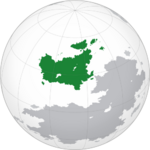IIWiki:Today's featured article: Difference between revisions
(November 2023 Update) |
(December 2023 Update) |
||
| Line 1: | Line 1: | ||
<div style="float:left;margin:0.5em 0.9em 0.4em 0;">[[File: | <div style="float:left;margin:0.5em 0.9em 0.4em 0;">[[File:Euclea_orthographic.png|150px]]</div> '''Euclea''' is a continent located entirely in the {{wp|Northern Hemisphere|Northern}} and {{wp|Western Hemisphere|Western}} Hemispheres of [[Kylaris]]. The name Euclea comes from the [[Piraea|ancient Piraean]] goddess Eukleia (Ευκλεια), the deity personifying glory and good repute. It is bordered to the north by the Pervovo Sea, Avanaric Sea, and Boreal Ocean, to the northeast by the Ghaillish Sea and North Sea, to the east by the Florian Ocean and Gulf of Assonaire, to the south by the Solarian Sea and Acheloian Sea, and to the west by the Lumine Ocean. [[Coius]] lies to the south and east. Euclea covers approximately one sixteenth of Kylaris's surface and is home to slightly over one fifth of its population. It is the world's second-most populous continent after Coius and is its richest on a gross GDP basis; nearly 40% of the world's aggregate GDP is generated in Euclea. Politically, Euclea is divided into approximately thirty states, twelve of which comprise the [[Euclean Community]]. [[Soravia]] is the largest and most populous country in Euclea. ('''[[Euclea|See more...]]''') | ||
<div align="right"> | <div align="right"> | ||
Revision as of 02:33, 6 December 2023
Euclea is a continent located entirely in the Northern and Western Hemispheres of Kylaris. The name Euclea comes from the ancient Piraean goddess Eukleia (Ευκλεια), the deity personifying glory and good repute. It is bordered to the north by the Pervovo Sea, Avanaric Sea, and Boreal Ocean, to the northeast by the Ghaillish Sea and North Sea, to the east by the Florian Ocean and Gulf of Assonaire, to the south by the Solarian Sea and Acheloian Sea, and to the west by the Lumine Ocean. Coius lies to the south and east. Euclea covers approximately one sixteenth of Kylaris's surface and is home to slightly over one fifth of its population. It is the world's second-most populous continent after Coius and is its richest on a gross GDP basis; nearly 40% of the world's aggregate GDP is generated in Euclea. Politically, Euclea is divided into approximately thirty states, twelve of which comprise the Euclean Community. Soravia is the largest and most populous country in Euclea. (See more...)
KEEP THIS ONE PARAGRAPH IN LENGTH so it doesn't push the main page section down below the other section.
